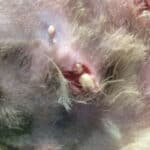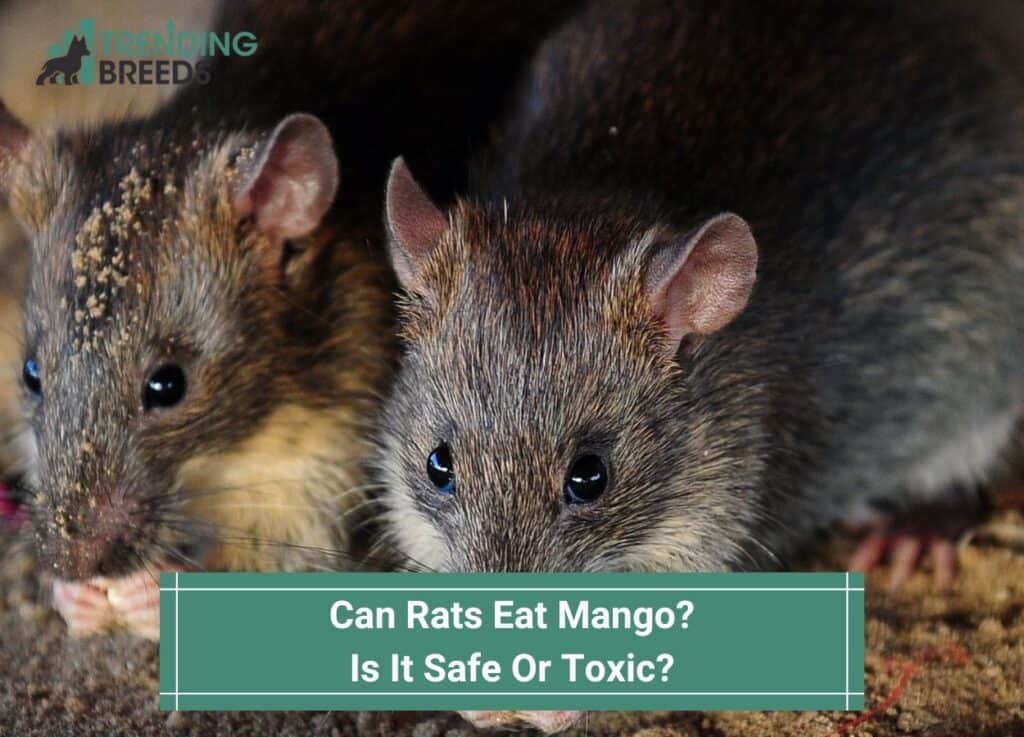
It is only male rats that are affected by d-limonene found in mangoes, not female rats. It is due to rat bucks producing a protein called alpha-2U-globulin that this happens.
These rats can accumulate this protein in their kidneys after consuming mangoes and citrus fruits that contain d-limonene. A specific type of kidney damage in male rats is first triggered by hyaline droplets, which are formed there.
Consequently, damaged kidney cells are more likely to become cancer cells later in life, resulting in kidney tumors.
This type of kidney damage can only be caused by male rats because does and dams do not produce alpha 2U-globulin. Unless the mischief is only female, you can feed mangos to them without causing them any harm.
A common factor in all the studies on kidney cancer of this type is the use of high concentrations of d-limonene, often over a long period of time17.
D-limonene levels in mangoes can only be reached by eating insane amounts. Therefore, rats are unlikely to have any problems with an occasional mango piece.
It’s not clear, however, whether d-limonene in smaller doses causes kidney tumors. Probably the best option for your buck is to just eliminate mango from his diet altogether. In the end, there are so many healthier options available.
It is unlikely that your male rat will be harmed if it accidentally eats some mango. If you notice any problems, notify your veterinarian as soon as possible.
Table of Contents
Other articles you would like: How to tell if you rat is too skinny? and Can Rats Fart?
Signs Of Kidney Problems In Rats
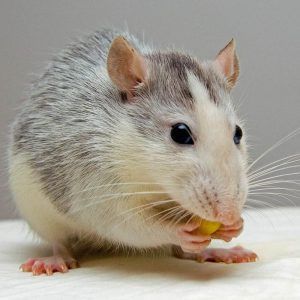
- Fatigue
- Reduced weight
- Problems with the kidneys and urinary system
- Urinary proteinuria
- Urine-specific gravity fixed
Veterinary tests will confirm the diagnosis of the rat by testing blood and urine.
Protein is usually found in excess in the urine of rats with kidney failure. Likewise, the urine’s specific gravity determines the ability of the kidneys to concentrate or dilute urine.
Can Rats Eat Mango Skin?

Similarly to citrus fruits, mangoes contain a higher concentration of d-limonene in their peels18.
Hence, mango peel is not recommended for your rat. Despite its tough texture, female rats are unlikely to eat mango peel because it isn’t very appealing to them.
Can Rats Eat Dry Mango?
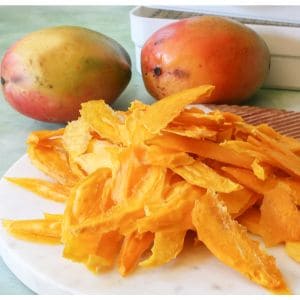
There are the same risks associated with dry mangoes as with any other type of mango. Your rat’s diet can certainly benefit from mangoes, as stated previously.
Nevertheless, they should be considered occasional treats rather than regular meals. It is not necessary for rats to eat a great deal since they are so small.
You should only give your rat about 1-2 teaspoons (about 10% of your rat’s diet) of treats. Treats should make up only about 10% of your rat’s diet.
If you give your rat too many mangoes, it is likely to experience diarrhea and an upset stomach. Mangoes are rich in fiber, which can be beneficial for your rat.
d-limonene can be found in mangoes and citrus fruits, which is important to consider if you own a male rat.
Male rats exposed to D-limonene developed kidney tumors. Citrus fruits are therefore recommended to be avoided altogether if your rats are male.
This chemical, however, caused tumors in rats after they consumed very high doses, which is important to note.
In the end, you must decide what is safe for your pet to eat. A small amount of mango on occasion is likely harmless, but its nutritional value depends on the individual.
Can Rats Eat Mango Seeds?
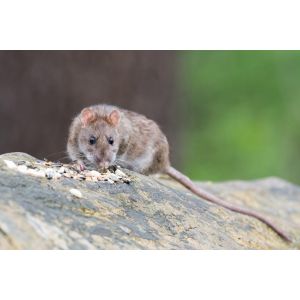
It contains a toxic compound called amygdalin, which can cause choking. Several animals are poisoned by cyanide when ingested. The seeds of mangoes contain 4.41 mg of amygdalin per gram, according to one study.
Dogs can be poisoned by this if they consume large quantities of it. It’s important to monitor your dog if they show any signs of illness after ingesting a mango seed, and to get them to your veterinarian right away.
What Fruits Are Toxic To Rats?
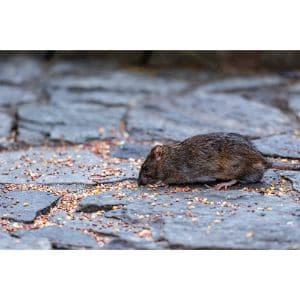
These fruits are toxic to rats and should not be fed to them in large amounts and in some cases not at all.
Cherries
The majority of their composition (82%) is water. Furthermore, they are low in fat and contain only a little protein. Cherries are primarily composed of carbohydrates, primarily sugar1.
Cherry stones are toxic because they contain amygdalin, which is converted by the body to cyanide.
Not treating cyanide poisoning in a timely manner can be fatal. A severe case is associated with loss of consciousness, nausea, vomiting, dizziness, and even coma and death.
Oranges
Several studies have shown that citrus fruits contain d-limonene, a chemical that causes kidney tumors in male rats if consumed in high doses.
Male rats should therefore not be given citrus. Oranges, however, make a good fruity treat if your mischief is entirely female. A protein called alpha 2U-globulin is produced in large quantities by adult male rats.
Lemon and citrus juices are rich in d-limonene, which binds to alpha 2U-globulin.
These rats then develop so-called “hyaline droplets” as a result of alpha 2U-globulin accumulating in their renal tubules. A male rat’s kidneys are damaged when these droplets appear.
The damaged kidney cells may ultimately become cancerous, leading to kidney tumors down the road. Does and dams do not have any issues after consuming foods containing d-limonene since alpha 2U-globulin is only produced by bucks.
Apple Seeds
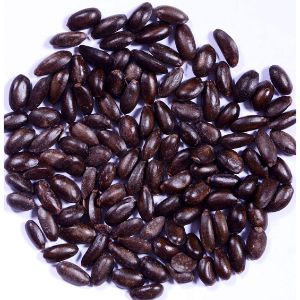
Apple seeds are forbidden to rats, but rats can eat small amounts of apples. Do not give your rat a piece of apple if you are not sure that you have removed all the seeds.
Neither rats nor humans can survive in apple seeds since they contain cyanide11. Rats are more at risk due to their lighter weights and faster metabolisms than humans because they would need to consume many, many apple seeds to become toxic.
Green Banana
His sensitive digestive tract cannot handle green bananas. Rats can benefit from a diet rich in ripened, yellow bananas.
Your rat’s digestive health is benefited by their vitamin and mineral content, as well as fiber. You can feed your beloved pet rat bananas, especially freeze-dried slices, to help ensure its health.
Avocado
Avocados are toxic in their skin and pit. The flesh near the skin and pit should not be fed to them, either. Skip avocado altogether if you want to be safe. The avocado plant causes toxicosis when its fruit, stems, leaves, or seeds are consumed.
Mammals and birds susceptible to the disease may suffer from sterile mastitis and myocardial necrosis. As of now, avocado toxicosis cannot be diagnosed and treated with tests, only addressing clinical symptoms.
Grapefruit

The peels of citrus fruits such as oranges, grapefruits and lemons may cause cancer in male rats, but they are safe for female rats. The same reasoning applies to papaya and mangoes being avoided by some rat owners.
What Fruits Are Safe For Rats?
You can feed your rats some of these fruits safely.
Grapes
It is safe for rats to eat grapes even though they can be toxic to some animals. Adding grapes to your rats’ rotation of treats will make them happy because they are sweet and refreshing.
Grapes, however, should be consumed in moderation, especially when dried into raisins.
This is because fruit is high in sugar and often contains a high amount of water. It is possible for rats to suffer from diarrhea and gastrointestinal distress when consuming high amounts of these factors.
Grapes should be peeled before being offered to rats so they won’t choke. It is not necessary to cut the grapes, but if your rats seem a little confused by the unusual shape, you may need to break them up.
Pears
You should only give rats pears as treats, not as a regular diet. Wash the portions thoroughly and cut them into small pieces since rats have a greater chance of choking on them.
Pears are safe for rats, however they should only be given as treats, not as a regular diet.
Keeping your pet away from seeds is recommended because they contain small amounts of cyanide.
Leaving fruits around their feeding spot for too long will also increase the risk of them rotting or getting moldy, increasing their likelihood of causing problems.
Blackberries
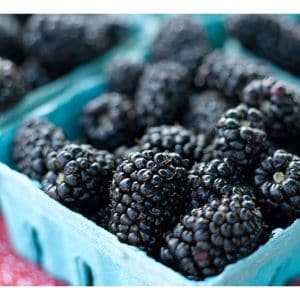
In addition to strawberries and raspberries, other berries such as blackberries and raspberries also make wonderful treats for rats.
Bear in mind, though, that berries contain sugar like most fruits. Therefore, if you wish to give them, do so in limited doses as well as removing any pits from them.
You will also like:
If you want to learn what to feed your rat, check out “Healthy Diet for Pet Rats | Rattiepedia: Episode 12” down below:

